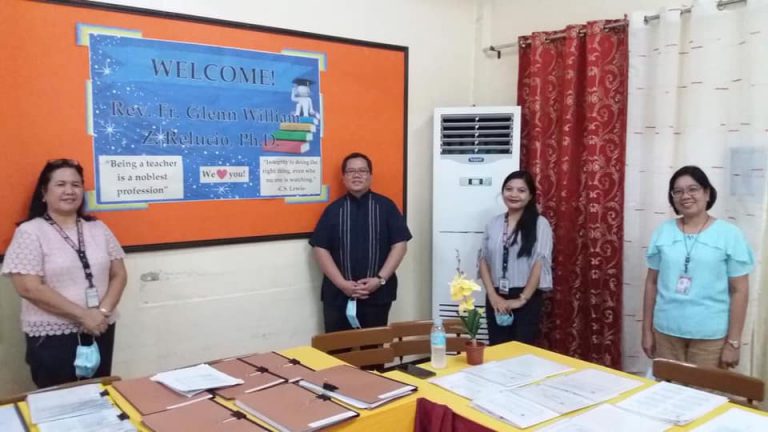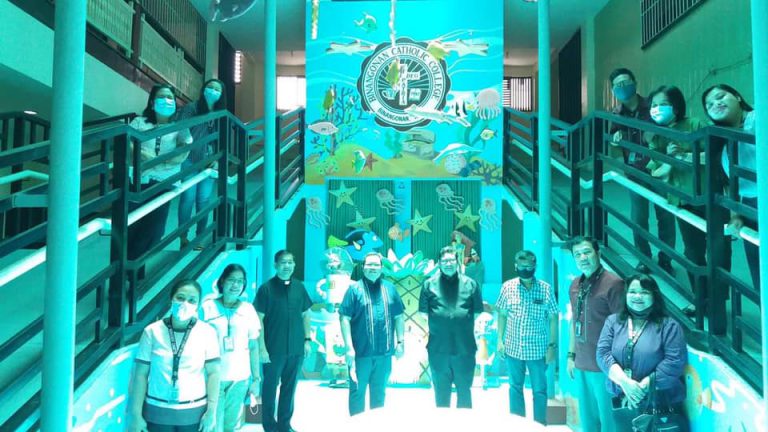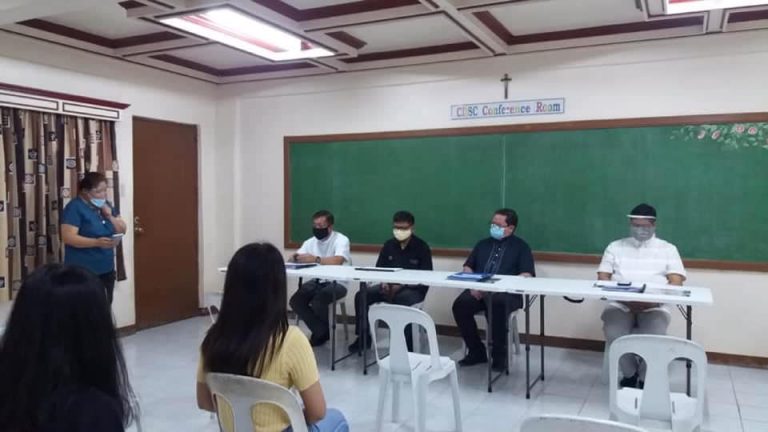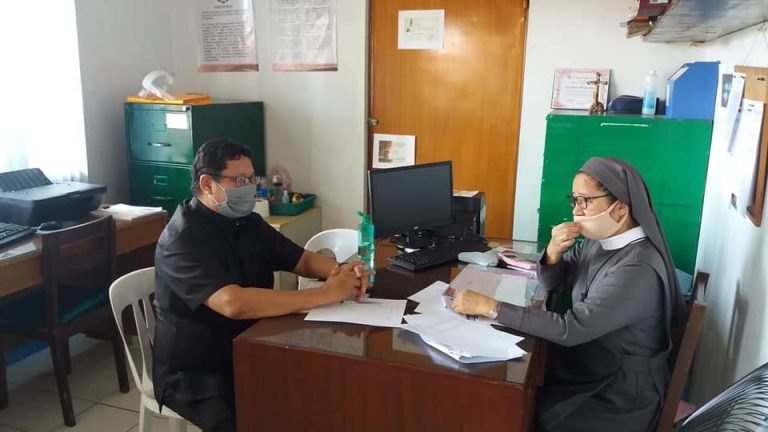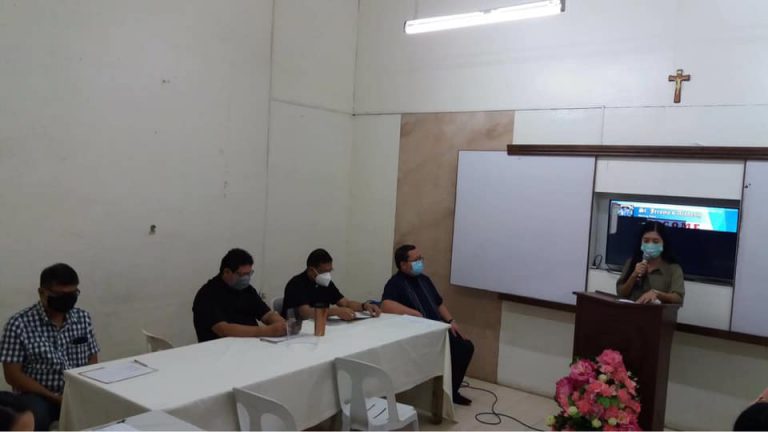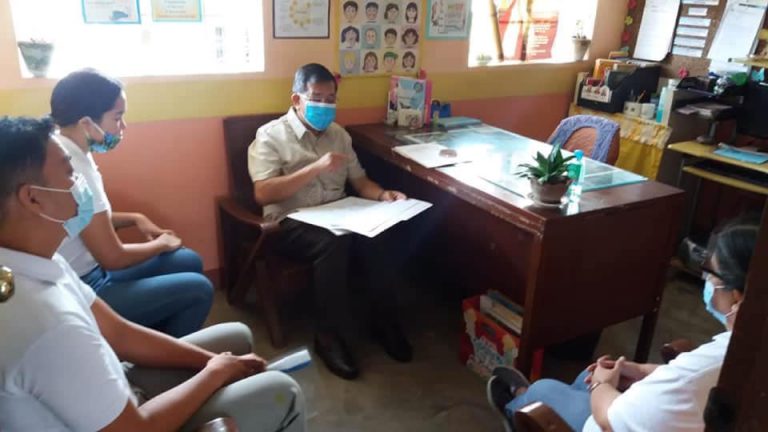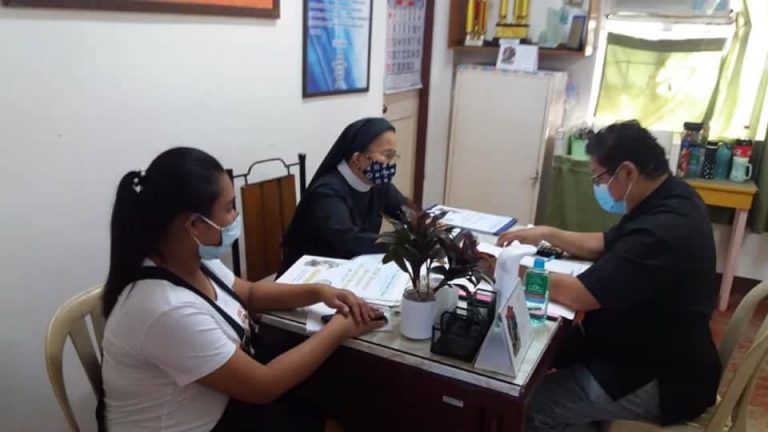- SUPERINTENDENT'S REPORT
- GRADUATE ATTRIBUTES
- THE LEARNING CONTINUITY PLAN
- INTENT
- CONTENT/ COMPETENCIES
- LEARNING EXPERIENCE
- DYNAMIC LEARNING PROGRAM
- DISTANCE LEARNING NORMS AND POLICIES
- QUALITY ASSURANCE
- SCHOOL CALENDAR
- BOARD OF TRUSTEES AND CLUSTER DIRECTORS
SUPERINTENDENT'S REPORT
GRADUATE ATTRIBUTES
A SERVANT LEADER – Having experienced the love of the Risen Christ, exemplifies a confident, dedicate disciple and effective collaborator fulfilling his mission to serve God.
A SEEKER OF TRUTH – Having Experienced the joy of the Gospel, excercises reflective and critical thinking by being a good communicator of God’s Word in local, global and digital environment.
A COMPETENT AND PERSONALLY ENGAGED CHRISTIAN – Having experienced a deep relationship with God, holds Christian values of being self-motivated resilient, service oriented, model of commitment and devoted witness of Christ.
A RESPONSIBLE STEWARD OF CREATION – Having experienced belief in one God who created the universe and all that is within it, commits to uphold the integrity of God’s creation, care and serve others.
A SOCIALLY RESPONSIBLE CITIZEN – Having experienced God’s mercy and compassion, demonstrates creative, innovative, and proactive actions guided by Catholic Christian ethics to address socio-civic and cultural challenges and concerns
THE LEARNING CONTINUITY PLAN
Transformative-Education Evangelization-Centered Digital Learning (TED)

PARADIGM OF TED
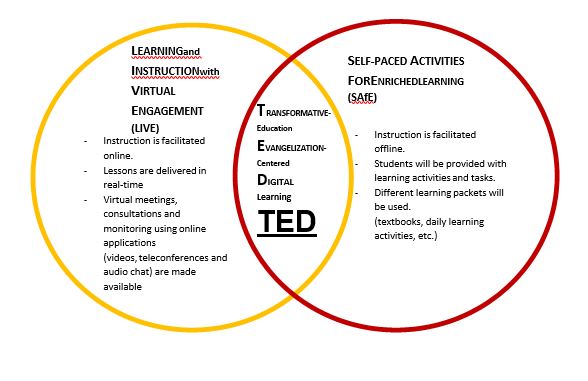
TED is the short form of the names Theodore and Edward. Theodore is a Greek name meaning “gift of God“, Edward has an English origin and means “wealthy guard”
Gift of God & Wealthy Guardian( regalo ng Diyos, gabaynapuno ng kaalamanyaman)
INTENT
The schools support the Sulong Edukalidad of the Department of Education Central Office and adhere to the ICLEP of the Region by ensuring the learning continuity through adaptation of DepEd Curriculum Guide and the Most Essential Learning Competencies with Values Integration and Religion as the core of the curriculum. Appropriate learning materials are made aligned to the adjusted curriculum. To ensure teaching and learning engagement, corresponding trainings, workshops and orientations for school leaders, teachers, students and parents shall be provided.
Learning Outcomes
The schools aim that after the course completion, students will gain knowledge, skills, and values through these processes;
1. Identify specifically what should be learned.
2. Align the content, instruction, integration and assessment.
3. Objectives of the lesson contents shall always be achievable and measurable.
4. Connect directly to the assessment criteria that are used to judge achievement.
5. Reflect (3) domains / 6 significant learning categories:
a. Cognitive (knowledge and intellectual skills with an emphasis on knowing, conceptualizing, comprehending, applying, synthesizing and evaluation)
b. Affective (improve students’ interests, attitudes and Christian values)
c. Psychomotor (develop manipulative and psychomotor skills of the students.
Learning Outcomes for students of a catholic education institution upon completion of the course, the students are expected to learn and develop the significant outcomes.

Support
To ensure that education process will continue, the school shall provide competent teachers equipped with trainings and orientations for the new normal set up. Learning resources and learning environment (e.g LMS MaPSA Antipolo Portal, learning stations, DLA’s area, stable internet connections, desktop, laptop and the like, conference applications – Zoom, Google Meet, Messenger etc., Elibrary) are made available. Students shall be assessed accordingly:
Assessment 20%: Summative 10% Periodical 10%
Performance Task 30%: Culminating Activity 20%, Integrated Activity 10% Written Work
50%: Daily Learning Activity 20%, Formative Assessment 30% Total 100%
CONTENT/COMPETENCIES
The school adheres to the continuous and holistic development of learners in the midst of the pandemic. The Most Essential Learning Competencies are useful in determining the content for the learners and the method on how we would like our learners to learn and what do they need to accomplish.
What is good in the MELCs is the focus on articulation within and across learning areas and the competencies are defined as what the students need, considered indispensable, in the teaching-learning process to building skills to equip learners for lifelong learning. ( Guidelines on the use of MELCS-DepEd)
The learning areas will ensure that the learning outcomes are achieved even during this pandemic. The content and competencies are contextualized in order to accommodate the varied learners, teachers and learning environments but not sacrificing the content and performance standards. This is to ensure relevant, quality and Catholic education despite the challenging academic year.


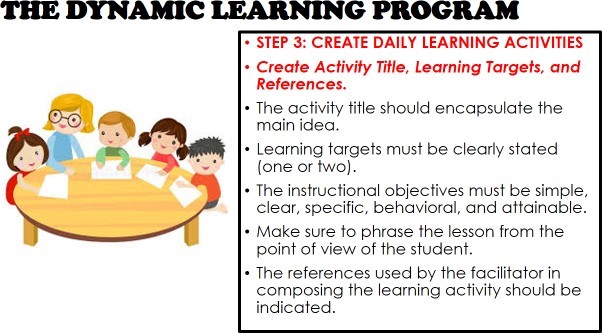







LEARNING EXPERIENCE
Learning Delivery Modalities
In order to ensure the smooth delivery of learning, we trained the teachers , parents/guardians on the learning delivery modes in the new normal. We conducted a survey on the availability of devices at home and their internet connectivity. The school devised a learning system or platform TED – Transformative-Education Evangelization –Centered Digital Learning. We employ Distance Learning: Online interactions using electronic devices; Self-paced learning guided by the modules /printed handouts and virtual consultations with the teacher. Applying Distance Learning we have
Synchronous Learning: Real time learning interaction; Teaching and learning sessions are scheduled; online tools and other messaging applications will be used for student- teacher interactions.
Asynchronous Learning: Pre- recorded sessions with the teacher; E mail can be used to reach out to students; learning materials are available via flash drive (USB)
Distance Learning Plans:
E – Learning Platform is designed equipped with PowerPoints which contains :Learning goals; Introduction/motivation; Lesson presentation; Integration ;Assessment ; with Religion as the core of the curriculum.
A. Transformative-Education
Blended learning is a model that combines both online and face-to- face learning spaces and experiences. It is flexible, empowering both teachers and students to improve learning outcomes amidst the uncertain environment. MaPSA-Antipolo embraces the following characteristics of blended learning:
1. Combination of online and in-school learning.
2. Once or twice in-school session per week.
3. Strict observance of physical distancing and other safety protocols
4. Physical Face-to-face will happen only when the government allows with strict observance of health and safety measures
5. Learning space with altar set-up constantly reminds connection with our Creator
6. Students’ progress thru dynamic learning activities is ensured
7. Learning takes place through Christ-centered curriculum and instruction
B. Evangelization-Centered
Spiritual formation is embedded in the Teaching-learning process making Religion as the Core of the Curriculum
1. Values Integration –values are Integrated in each lesson
2. Faith Sharing – Engage students to be part of Parish activities and Encourage them to support the community in different means.
3. Faith Experience –Celebrate God’s grace thru online activities.
Attending online masses, online recollections and others.

Teaching-learning Model making Religion as the Core of the Curriculum
C. Digital-Learning
The MaPSA-Antipolo E-learning Platform is the backbone of the digital learning. This platform has a responsive interface design which allows it to be easily used in any screen size or any type of electronic devices like smartphones, laptop, desktop, etc,. Students may access lectures, supplementary activities, connect with their teachers and participate in online classes. It has simple features that ensures the success of holistic progress of the learners.
Learning Resources
To be able to deliver Instructions, we have the following resources made available in every learning stations , at home and in school: Stable internet connections; Desktop, Laptop or Smart Phones; Headsets; earphones; microphones; speakers. MaPSA E – Learning Platform will be employed with Power points constructed by experts in the different subjects. We ha ve an installation of Conference Applications like; Zoom, Google Meet, Messenger Room , etc.) We also require learning space for students at home, for conducive and wholesome learning atmosphere.
We have trained teachers on the use of the LMS Learning Management System which delivers the MaPSA E Learning platform. Teachers attended Webinars about the different online teaching and Learning Modalities in order for them to carryout quality delivery of Instructions.
The MaPSA-Antipolo e-Learning Platform

DYNAMIC LEARNING PROGRAM
The K-12 Curriculum Guide and the newly released Learning Management Matrix given by DepEd is to guide us in teaching this SY 2020-21. It should be sorted by week per quarter.
STEP 1: IDENTIFICATION OF LESSON/TOPIC FOR THE WEEK
• TEACHER should revisit the DepEd documents (Curriculum Guide and the Most Essential Learning competencies), then go to your specific subject matter, take down the following: Lesson-Topic for the week; then the week number from the Most Essential Learning Competencies.
STEP 2: IDENTIFICATION OF MAJOR CONCEPT FROM THE LESSON FOR THE WEEK.
Based on the Essential Learning Competencies and the DepEd Curriculum Guide, the teacher needs to identify 5 major concepts where one of the 5 concepts signifies one lesson that they will teach a class on a particular day.
• The concept notes must be self-explanatory so that the average student can accomplish the activity even without a prior lecture by the teacher.
• The teacher must visualize the lecture he/she plans to give for that day.
STEP 3: CREATE DAILY LEARNING ACTIVITIES
A. Create Activity Title, Learning Targets, and References.
• The activity title should encapsulate the main idea.
• Learning targets must be clearly stated (one or two).
• The instructional objectives must be simple, clear, specific, behavioral, and attainable.
• Make sure to phrase the lesson from the point of view of the student.
• The references used by the facilitator in composing the learning activity should be indicated.
B. Re-write the Daily Learning Activity in MS Word
Partitions:
– Main idea to be learned.
– Example
– Questions/Exercises
• This activity will be done by the student daily. To monitor the daily activity of the students, they need to have outputs by accomplishing the activity sheet.
• The format of the activity sheets is based on the Dynamic Learning Program or DLP where the students work on the activity for most of the class period without prior lecture, discussion or demonstration from the teacher.
• The teacher must visualize the lecture he/she plans to give for that day.
• The teacher must include the detail/s since he/she is not present to give the lecture.
• The assessment and evaluation part can be written in a form of a question or problem to be solved by the learner.
• Question/task should address the learning target.
• Task should progress from easy to medium to difficult to engage even the intellectually challenged.
Kindly take note of the following:
• Always remember that activities are accomplished by the students without a prior or introductory lecture.
• One activity presents one major concept.
• Ideally, an activity should fit one page, legal size, font 14, and should be self-contained.
• Rule of thumb for time allotment: Students should be given 4X the time it took the teacher to accomplish the same task. (If the teacher took 15 minutes to finish the activity, the student should be given 1 hour.)
STEP 4: CREATE A POWERPOINT PRESENTATION FOR EACH MAJOR CONCEPT.
Here are the contents of the Powerpoint Presentation (This should be Textbook based)
1. Introduction
2. Background
3. Main Idea to be learned.
4. Example
5. Problem and solution – must address Multiple Intelligences
STEP 5: Ask the students to copy the whole daily learning activity by hand on a long or legal-sized bond paper. Answer sheet on a separate paper and must be hand-written as well.
• Copying by hand enhances the “psychomotor plus visual”. Reinforces
reading and comprehension skills as well as vocabulary expansion.


DESIRED LEARNING OUTCOMES
Students will be evaluated in different forms of assessment:
DIAGNOSTIC– a pre-assessment where teachers can evaluate students’ strengths, weaknesses, knowledge, and skills before their instruction. Each student will be given a 20-30 item test to diagnose their prior knowledge about the subject matters. Using google forms or electronic test.
FORMATIVE– each teacher will give at least one formative assessment per week these can be done using the following strategies:
• Impromptu quizzes (Kahoot, Google forms or Fyrebox)
• Short comparative assessments
• One-minute paper
• Exit card
• Silent classroom polls
DAILY LEARNING ACTIVITIES(DLA)– each subject teacher will give at least 2 DLA which these output is an evidence of their progress learning in each competencies. Please refer to Dynamic Learning Program for details.
AUTHENTIC – A performance or real life situation assessment will be given to the student using the following guide;
Performance a Task: ask students to demonstrate understanding by performing a more complex task usually representative of more meaningful application.
Real-life: demonstrate proficiency by doing something like cooking, drawing, dancing, and etc.
Construction/Application of Knowledge: ask students to analyze, synthesize and apply what they have learned in a substantial manner, and students create new meaning in the process as well.
Student-structured: authentic assessments allow more student choice and construction in determining what is presented as evidence of proficiency.
Direct Evidence: on the other hand, offer more direct evidence of application and construction of knowledge by showing real life directed evidence

INTEGRATED ACTIVITY – each subject will integrate across discipline to get authentic assessment from each student.
Sample interdisciplinary web

SUMMATIVE –evaluate student learning and academic achievement at the end of a unit/chapter. Student will answer the assessment online using google forms/ exam.net.
GRADING SYSTEM
Realignment of the grading system putting the more weight on the students daily activities.
Assessment 20 % : Summative 10%, Periodical 10 %
Performance Task 30% : Culminating Activity 20%, Integrated Activity 10%
Written Works 50% : Daily Learning Activity 20%, Formative Assessment 30%
Total 100%
INSTRUCTIONAL PROCEDURES
Teacher will teach using the LMS of MaPSA Antipolo the learning portal instructional material includes:
a. Learning Goals and Standards
b. Introduction
c. Lesson Proper
d. Integration
e. Assessment
f. References


PLAN AND SCHEDULE OF ONLINE DISTANCE LEARNING
Student will have online sessions (Synchronous) for 2 hours only per day with specific breaks and a corresponding 2 hours offline daily activities (Asynchronous). Friday is dedicated for Online consultation and weekly submissions of activity sheets.



ORIENTATION TRAINING PLAN FOR PARENTS
Parents and school administrator conduct zoom meetings to the parents presenting the LCP. Other primers orientation posted in the FB page. Parents who does not attend the meeting can be guided in the different announcements posted in the school FB page.
COMMUNICATION MECHANISM
Parents were communicated thru the FB page, messenger, email and land line. Updates were posted thru the FB page and queries were answer in different ways via telephone or email. School assigned persons to answer quires of the parents.
MONITORING & EVALUATION AND PLAN ADJUSTMENTS
All scheduled trainings and activities have a provision to adjust dates prior to the opening of classes. The four cluster school Directors conduct Quality Assurance Visitation to ensured MaPSA-Antipolo member schools are all ready in the new learning Modality.




DISTANCE LEARNING NORMS AND POLICIES
A. GENERAL POLICY
1. The class will begin and end with a prayer.
2. All transactions should be done during official time only.
3. Sending personal messages to teachers or to students (vice-versa) is prohibited.
4. The use of the discussion board is highly encouraged for concerns and clarifications.
5. Data privacy act strictly applies on any unauthorized capturing, recording, sending and sharing of any messages, photos, videos and the like. (refer to Republic Act 10173 – Data Privacy Act of 2012 and school manual)
6. Disciplinary measures still applies in reference to the school’s handbook.
7. Official announcement will be posted on the MaPSA E-learning platform.
B. REQUIREMENTS FOR DISTANCE LEARNING
1. Stable internet connection
2. Desktop, Laptop or Smart phones, headsets/earphones/microphone/ speaker, etc.
3. MaPSA E-Learning Platform
4. Installation of Conference Applications (e.g. Zoom, Google Meet, Messenger Room, etc.)
5. Conducive learning space (online / offline) that is free from noise and with good ventilation, a quiet and well-lighted area where one can concentrate and be easily visible and recognizable.
6. Learning materials must be available in the learning space (altar/ spiritual symbols, notebooks, pen, prescribed textbooks, portfolio, etc.)
C. BEFORE VIRTUAL SYCHRONOUS LEARNING:
1. Wear complete school uniform.
2. Strictly observe proper grooming.
3. Stay muted upon entering the online class.
4. Set your full name during online class.
5. Use the official e-mail address provided by the school.
6. In case of absence notify the adviser.
7. Virtual presence is required during online class as a concrete proof of attendance.
8. Follow class schedule religiously.
9. Enter the online class by schedule.
10. A Learning Partner’s assistance is needed in the preschool and primary
level, but is optional in higher grade levels.
D. DURING VIRTUAL SYCHRONOUS LEARNING:
1. Start with a prayer.
2. Observe proper learning etiquettes.
3. Stay focused.
4. Wear headset / earphones to minimize background noise.
5. Have the paper, pen, notebooks beside you to write important notes and textbooks for your reference.
6. Stay muted throughout the duration of the online class.
7. Maintain a formal classroom atmosphere at all times. Any form of distractions such as eating, playing, and the like should be avoided. Stay seated while the online class is ongoing.
8. Pay attention to whoever is speaking. Look into the camera.
9. Ask questions live by raising the hand and wait for the teacher’s
acknowledgment before answering.
10. Turn on microphone only when responding to or asking questions.
11. Use the chat box for other queries. Stay on the topic when chatting
12. Always be respectful. Use appropriate language during class interaction. Use a calm and normal voice to speak.
13. Video recording, screen recording or capturing photos during online class is strictly prohibited.
14. Respect the virtual classroom guidelines.
E. AFTER VIRTUAL SYCHRONOUS LEARNING:
1. Finish all tasks according to schedule and submit pertinent requirements on time.
2. Review notes for learning activities
3. Check communications platform regularly (email, chat box, MaPSA E- learning)
4. End the class with a prayer.
F. THE LEARNING PARTNER
The Learning Partnership is designed to support Teachers and Learners in optimizing the development of the learning competencies. The Learning Partner is the Parent or a sibling or a relative of the Learner who will assist to acquire the skills, knowledge, and attributes necessary to attain one’s learning goals.
A Learning Partner is required in the preschool and elementary level and optional to the other grade levels.
1. The Learning Partner assists the Learner in the setting-up of online learning and maintaining discipline during class to ensure a well-guided online learning experience.
2. During online examinations, the learning partner should safeguard honest test results by limiting intervention to assisting but not on giving answer.
3. A learning partner may assist the student in reminding class schedule, deadline of submissions and coordination to teachers and transaction to school offices.
4. Learning Partner must wear decent attire while assisting the Learner in the online class.
5. The Learning Partners should abide by the online learning policies.
G. ONLINE EXAMINATION POLICY BEFORE:
1. Follow the scheduled examination dates and time.
2. Secure examination permit before taking the periodical examinations.
3. Clear the online learning space from any unnecessary materials.
4. Log-in for attendance five minutes before the scheduled examination.
5. Open the camera before taking the test.
DURING:
1. Take the examination according to the time limit.
2. Keep camera open while taking the test.
3. Stay focused on the examination, maintain proper eye level and refrain from looking around.
4. Honesty and truthfulness is expected at all times.
5. Browsing of answer in any form is strictly prohibited.
6. Backtracking of exam is not allowed.
7. For clarifications regarding the test, use the chat box.
AFTER:
1. Log-out after taking the test.
2. Any information shared or leaked about the examination is a serious offense.
3. School policy applies for special examination.




